Are You a ‘Work First’ or ‘Play First’ Myers-Briggs® Personality Type? Find Out!
A few days ago I published an article describing the favorite leisure-time activities of all 16 Myers-Briggs® personality types. The results were based on a survey I conducted of over 85,000 email subscribers, clients, social media followers, and friends. Today I want to take a closer look at that survey, because in it, I asked the question “Do you tend to work before you play, play before you work, or mix work with play?” The results of that survey can give us some insights into the ways the different personality types approach tasks versus fun. Ideally, we’d all have a healthy mixture of both in our lives, but I do find that, in general, Judgers are more apt to prioritize work over play and Perceivers are more likely to mix work with play. There are pros and cons to both approaches, but let’s take a look at the results!
Not sure what your personality type is? Take our new personality questionnaire here. Or you can take the official MBTI® here.

Are You a ‘Work First’ or ‘Play First’ Myers-Briggs® Personality Type? Find Out!
Table of contents
- Are You a ‘Work First’ or ‘Play First’ Myers-Briggs® Personality Type? Find Out!
- The INTJ “Strategist”
- The INTP “Prodigy”
- The INFJ “Mystic”
- The INFP “Dreamer”
- The ISTJ “Detective”
- The ISTP “Vigilante”
- The ISFJ “Protector”
- The ISFP “Virtuoso”
- The ESTJ “Captain”
- The ESTP “Daredevil”
- The ESFJ “Defender”
- The ESFP “Champion”
- The ENTJ “Director”
- The ENTP “Trailblazer”
- The ENFJ “Mentor”
- The ENFP “Visionary”
- What Do You Think?
- References:
Estimated reading time: 18 minutes
The INTJ “Strategist”
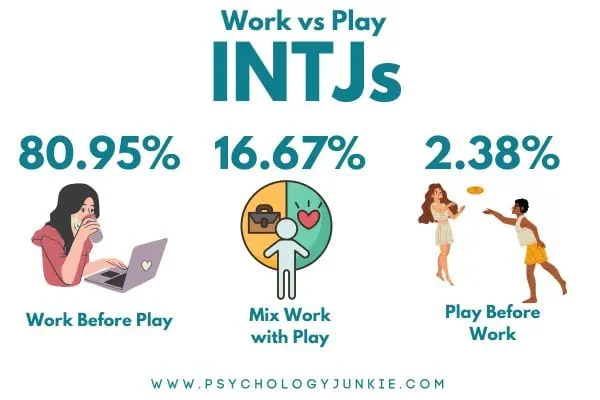
The INTJ results fit the typical pattern of Judgers preferring work versus play as opposed to mixing it up. For INTJs, leisure isn’t leisurely unless the must-do tasks are accomplished first. Asking an INTJ to take a break and go do something fun when they’re in the middle of a task is usually a recipe for disaster. They’ll spend the whole time stressing over the task that has been left unfinished instead of really being present in the moment and enjoying whatever exciting thing is happening. Now, as you can see from the results of the survey, this isn’t a unanimous quality of INTJs. There are still a smaller percentage who do know how to mix it up or even a very few who prioritize play before work (mysterious beings, I’ve never met an INTJ like this!). But overall, INTJs are much more likely to want to get the to-do list checked off before they even think about fun or leisure.
Find out more about INTJs: 10 Things You Crave Every Day as an INTJ Personality Type
The INTP “Prodigy”
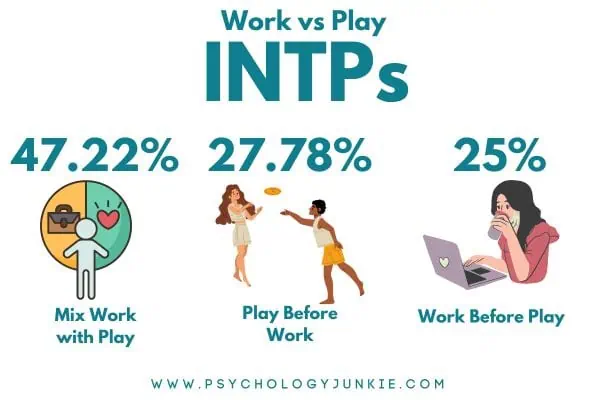
And now we can see how the “P” at the end of the type code really makes a difference. There’s a stark contrast between the INTJs work vs. play style and the INTPs work vs. play style. For the INTP, getting the best end result is better than simply crossing an item off their list. INTPs like to take breaks in their work to research, experiment, explore, or even go do something else entirely, so that they can come back to the project with a fresh perspective and perhaps even a new, innovative take. While it can look irresponsible to some Judger types, there is a method to their “madness” and, when INTPs are at their best, their approach can lead to a refined, creative, original end result. For the unhealthier INTPs, it can end up leading to pure procrastination and a series of unfinished projects.
Want to know more about INTPs? Read All About the INTP Personality Type
The INFJ “Mystic”
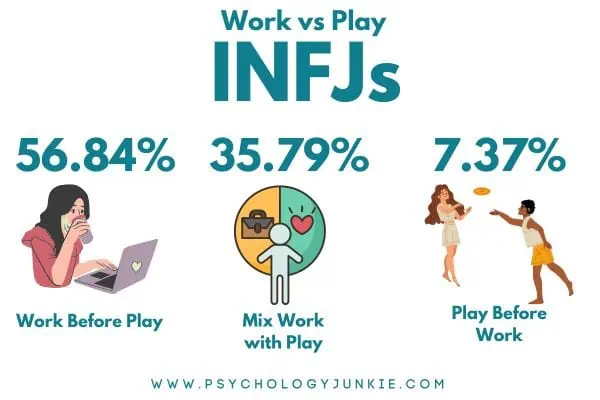
INFJs typically prioritize their to-do list before they entertain leisure pursuits. However, INFJs are less gung-ho about tasks than NTJs are. This is likely because INFJs prioritize interpersonal connection much higher than they do impersonal tasks. They’re also more driven by the pursuit of an intangible sense of meaning than they are numbers and objectives. Of course, NTJs are driven by this as well, but the Extraverted Thinking process in their cognitive function stack gives them a natural focus on numbers, metrics, objectives, and goals. In contrast, INFJs are more interested in meaning-making and how it applies to people. Thus, an INFJ will typically feel more comfortable pausing a task if it means they are having a more meaningful impact on other people. Several INFJs who took the survey said that they need breaks here and there to listen to music, take a walk, or meditate in order to clear their head and regain focus.
Find out more about INFJs: 10 Things You Crave Every Day as an INFJ Personality Type
The INFP “Dreamer”
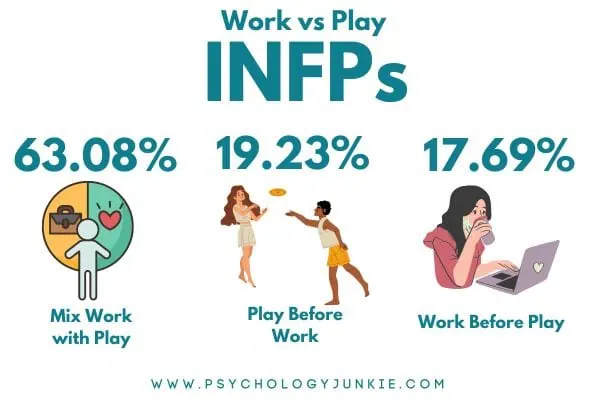
For INFPs, work and play are intrinsically linked. As one INFP in my survey said, “I can’t do my best work if I’m not inspired, and to stay inspired I need moments to listen to a song that gets me motivated, little breaks to recharge and jot down a few thoughts, or even a chance to take a walk and be in nature. I perform better when I have these moments to clear my head or get into the creative zone I need to be in.” For INFPs, turning out their best possible work is key. They hate being rushed, but when they’re in their element they are capable of original, innovative, and highly-refined creative results. Their goal is to integrate lots of information and creative ideas into one best possible result. They believe it’s worth taking extra time to integrate all this information, get themselves into the right headspace, and maybe even take a little longer if they can turn out their highest quality work.
Read more about INFPs: 10 Famous INFPs Who Changed the World
The ISTJ “Detective”

ISTJs, like their INTJ type-cousins, tend to be work-before-play people. They hate having tasks hanging over their heads, and will typically have a difficult time being present for fun activities if they know they have projects left unfinished. They’re the kinds of people who will get started on a task as soon as it’s assigned in order to finish it ahead of schedule. That said, there are definitely outliers. 19.44% of the survey respondents said that they do mix work with play. When I asked a few ISTJs about this, they said that their idea of mixing work with play meant taking an occasional break to meditate, connect with a family member, or go for a brisk walk to recharge and clear their head. Many said that they often take pauses to make sure that they have their goals all lined up in the right order and have a clear path forward. Jumping straight into a task without a clear agenda or strategy is a major no-no for these dutiful types.
Find out more about ISTJs: 20 Amazing Fictional ISTJ Characters
The ISTP “Vigilante”

ISTPs, unlike most Perceivers, showed a stronger leaning towards finishing their work before playing. This wasn’t too surprising to me as I have seen this with ISTPs I’ve worked with in my own professional life. ISTPs highly value their free time, but they don’t like feeling “indebted” to anyone. Having 100% independence is crucial. Thus, many times they’d rather just get all their work done as efficiently as possible so that they can be fully autonomous to pursue whatever their heart desires. One ISTP said, “I’m so protective of my free time I don’t want anyone telling me I owe them anything or anyone checking up on me so I just get all my work done as quickly as I can.” Another ISTP said, “I pay careful attention to the details of a task I’m assigned. If it’s due in one week and I know I can finish it in a few hours, I’ll put it off till the last day, but if I’m given tasks to do today I’ll just get them done so that the rest of my day is free.”
Read more about ISTPs: 10 Signs of an Unhealthy ISTP
The ISFJ “Protector”

ISFJs are another type that tends to prefer work before play. In my survey, 71.11% of ISFJs stated that they’d rather get all their work done before taking part in leisure activities. This comes as no surprise given their dutiful, planned, and routine-oriented nature. ISFJs are happiest in environments where they can follow a set routine and know from one day to the next how things should go. Reliable to a fault, they take their commitments seriously, whether they’re at home, at work, or within their community. That said, there are those who mix work with play—26.67% of survey respondents mentioned taking occasional breaks to balance their responsibilities. For these ISFJs, integrating short pauses allows them to recharge so that they can maintain their productivity without feeling overwhelmed. A smaller 2.22% opt for play before work, finding that a little relaxation, laughter, or creative time helps them tackle their to-do list more effectively.
Find out more about ISFJs: Confessions of an Unhealthy ISFJ
The ISFP “Virtuoso”
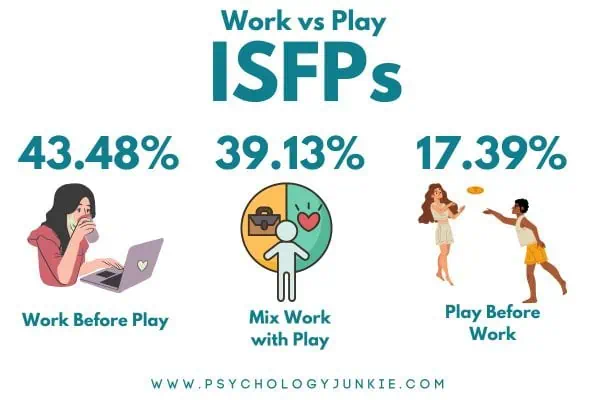
ISFPs are a versatile and varied group when it comes to balancing work and play. According to my survey, 43.48% of ISFP respondents prefer to get their work done before diving into leisure activities. This approach allows them to free their minds from looming tasks and fully immerse themselves in the present moment. On the other hand, 39.13% of ISFPs enjoy mixing work with play, finding that taking intermittent breaks helps to maintain their creativity and motivation. For these ISFPs, the seamless integration of work and play ensures that they stay engaged and inspired throughout their tasks.
Interestingly, 17.39% of ISFPs opt for play before work. They find that a bit of downtime, relaxation, or even spontaneous fun can recharge their batteries and set them up for more focused and productive work sessions. After all, you only live once, and what will you regret more? Working less or playing less? Most ISFPs would regret the latter. One thing remains consistent: ISFPs care more about doing work they can be proud of than doing work rapidly. Frequently in the comments I saw ISFPs mentioning that they hate feeling rushed, that they do their best work on their own timeline, but that they also understand the need for deadlines as well.
Find out more about ISFPs: The Unhealthy ISFP
The ESTJ “Captain”
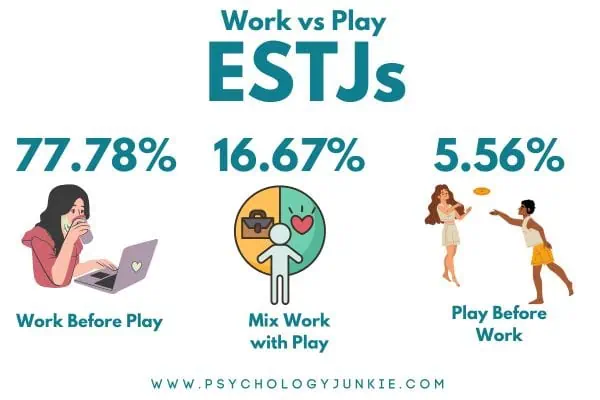
ESTJs definitely veer towards work before play, with 77.78% of respondents saying they would rather get their to-do list finished before moving on to leisure pursuits. ESTJs are task-oriented, deadline-focused, and organized. Most “Captains” hate looming deadlines and the feeling that something they’re working on is left unfinished. Rather than a leisurely pace, they tend to push for fast results, quick decisions, and an efficient and rapid timeline. Yet, as with all the types, there are outliers. 16.67% of ESTJs said they mix work with play, and 5.56% said they play before they work. One retired ESTJ in the comments said that he’s put in his years of hard work and now he’s more likely to prioritize play, personal hobbies, and family time over work tasks.
The ESTP “Daredevil”

For ESTPs, life is meant to be lived to the hilt. Action-oriented and daring, they aren’t afraid to work hard and play just as hard. 42.84% of ESTPs said they mix work with play, with several ESTPs commenting that they like to work with a team and take breaks to play little games, chat, or do something recreational. 39.16% of ESTPs said they work before play, and 18% said they play before they work. And while ESTPs may not be move through a lot of drudgery and busywork quickly, they prioritize solving immediate problems rapidly. In any kind of a crisis, ESTPs will move to action swiftly, trying to troubleshoot and fix things as quickly as possible. They tend to delay on tasks when there’s time before the deadline, it’s not a pressing demand, or they won’t see any immediate impact. But if there’s any sense of urgency, you’re unlikely to see anyone who can move more quickly than this Daredevil.
The ESFJ “Defender”
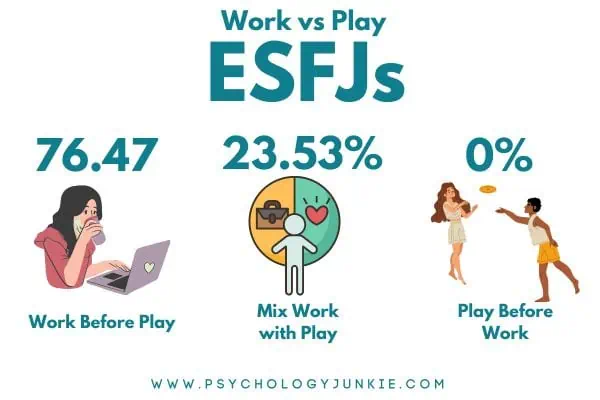
When it comes to ESFJs, it’s no surprise that the majority – 76.47% – prefer to work before they play. ESFJs are known for their responsible and diligent nature, often putting the needs of their community and loved ones above their own. These individuals thrive on social connections and the joy they get from making a real, practical difference in the lives of others. Their organizing skills and detail-oriented approach ensure that tasks are completed efficiently, leaving little room for procrastination. Unlike many other Judging types, a notable 0% of ESFJs prioritize play before work. However, there is still a significant 23.53% who manage to mix work with play, balancing their structured routines with moments of friendly social interaction. ESFJs know the importance of connecting with others and often integrate this into their work, making tasks feel less like chores and more like opportunities to build relationships and spread positivity.
The ESFP “Champion”
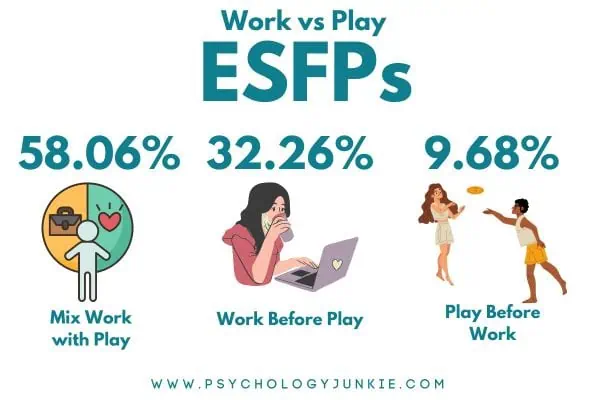
For ESFPs, mixing work with play is their forte, as the survey results reveal. 58.06% of respondents in this category said they prefer to blend tasks with fun. As high-energy, action-oriented types, ESFPs like to make the most of each moment, making sure that every task they is infused with a sense of excitement and teamwork. For ESFPs, getting everyone involved, working as part of a team, and making work fun is paramount. But if they have to work alone, they tend to work in bursts of intense energy, sometimes at the last minute, but not always.
Linda Berens, a renowned psychologist, says of ESFPs, “In their thought processes, they often experience a swirl of input all at once. To manage all these nearly simultaneous perceptions, they want to know what is relevant so they can focus their attention – what’s the goal? Then they process the information so fast, they know what is important and what is wanted – they “get it.” Then they want to be off, achieving the goal. They often find it frustrating to have to stay tuned in, while others are delving deeper or going methodically from A to Z.”
The survey also highlights that 32.26% of ESFPs prefer to work before they play, revealing a significant proportion who recognize the importance of prioritizing responsibilities before diving into fun. These Champions still embody the fun-loving ESFP spirit but are likely to tackle their to-do lists head-on before diving into a more playful and relaxed state.
Discover more about ESFPs: 24 Signs That You’re an ESFP
The ENTJ “Director”

No surprise here, ENTJs gravitated towards work before play by a staggering 88.89%. These types hate dilly-dallying and procrastination, and tend to feel infuriated when they’re distracted from their overall goals by pointless side-pursuits. One ENTJ commented, “I do not see the point in mixing work with play. It derails your focus, throws the timeline off, and I couldn’t even really enjoy it because I’d know my main goal is still unfinished.”
Yet not all ENTJs were so against a little play blended in with their work. 11.11% of ENTJs said they mixed work with play, with several commenting that they take occasional breaks to grab a coffee, brainstorm with friends, or get some exercise to refocus themselves.
Find out more about ENTJs: 24 Signs That You’re an ENTJ, the Director Personality Type
The ENTP “Trailblazer”

It’s amazing what that Judging/Perceiving difference makes! Moving from ENTJs to ENTPs, you see almost a complete switch in work styles. 75% of ENTPs like to mix work with play while 25% play before they work. None of the ENTPs surveyed (127 ENTPs took the survey) chose “work before play” as their preferred style. As Intuitive-Perceivers, ENTPs do their best work when they can experiment, innovate, research, and explore related subjects or ideas for inspiration. Methodically starting and finishing a project in one stretch tends to be a lackluster and uninspiring experience for them because it doesn’t allow them to take time to play with ideas, get creative, or simply recharge and refocus. One ENTP commenter said, “I need to take breaks during work to go for a jog or play a game or get up and move around; it helps me to put more energy into my work instead of fizzling out and handing in something mediocre.
The ENFJ “Mentor”
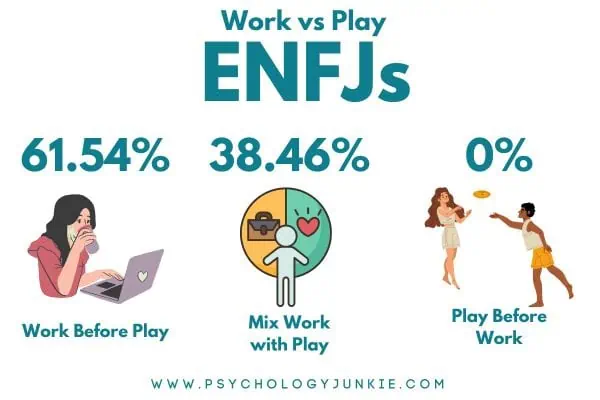
ENFJs, like the rest of the Judging types, prioritize work before leisure activities. According to the survey, 61.54% of ENFJs prefer to complete their tasks before engaging in fun (although for many ENFJs, they choose meaningful work that is fun). For these individuals, the satisfaction of crossing off items on their to-do list provides a sense of accomplishment and peace of mind, allowing them to fully immerse themselves in leisure activities later on. That being said, 38.46% of ENFJs expressed a preference for mixing work with play. These ENFJs often find balance by interspersing breaks and social interactions within their work routine, which helps them stay motivated and energized. Interestingly, none of the surveyed ENFJs indicated a preference for play before work, which indicates that even the most flexible of them still hold a structured approach towards managing their tasks and leisure.
Find out more about ENFJs: The Blessing and the Curse of Being an ENFJ Empath
The ENFP “Visionary”

According to the survey, 61.90% of ENFPs mix work with play, 28.57% prioritize play before work, and 9.52% prefer to work before they play. These statistics show us that ENFPs, like most Perceivers, enjoy blending their work and their fun. They are at their best in environments where they can brainstorm, collaborate, and bounce ideas off others, making every task an adventure in imagination and exploration. ENFPs enjoy working with people and are often the ones who motivate and inspire team members to get involved and energized. Their work style might seem haphazard to more structured types, but their ability to infuse play into their work often leads to innovative solutions and a dynamic, motivated work atmosphere. For ENFPs, the boundary between work and play is delightfully blurred, and this intermingling showcases their ability to bring enthusiasm and creativity to whatever they do.
Find out more about ENFPs: The ENFP Learning Style
What Do You Think?
How do you like to organize your time? Are you someone who wants to check everything off your list before you make time for fun? Or are you the other way around? Did the results of the survey surprise you? Let us and other readers know in the comments!
Make even more discoveries about your personality type in our eBooks, Discovering You: Unlocking the Power of Personality Type, The INFJ – Understanding the Mystic, The INTJ – Understanding the Strategist, and The INFP – Understanding the Dreamer. You can also connect with me via Facebook, Instagram, or Twitter!

References:
The 16 Personality Types: Descriptions for Self-Discovery by Linda V. Berens and Dario Nardi (InterStrength, 1999)
Understanding Yourself and Others™ An Introduction to Interaction Styles by Linda V. Berens (InterStrength, 2008)



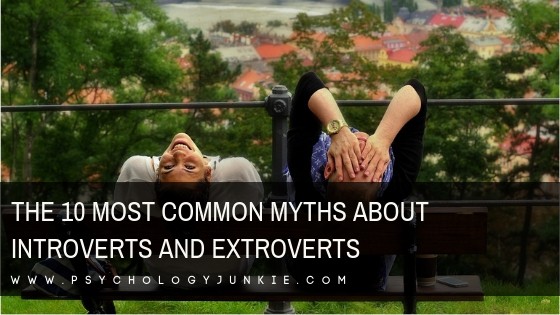
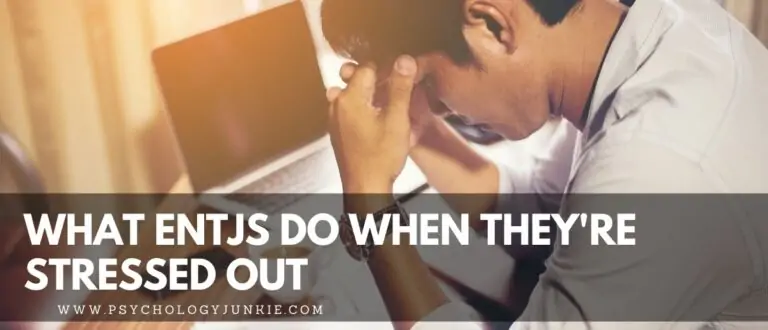
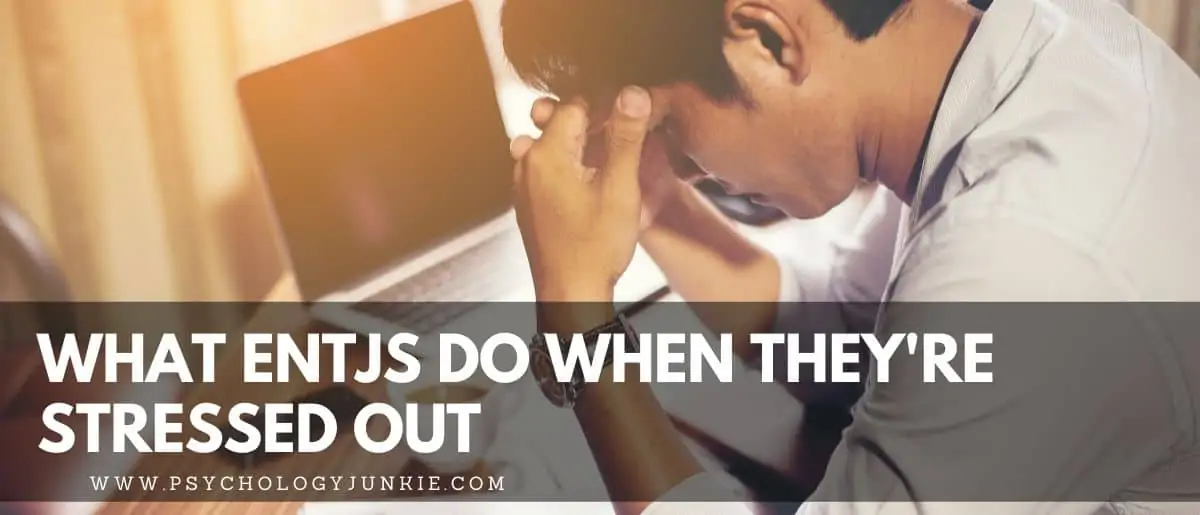




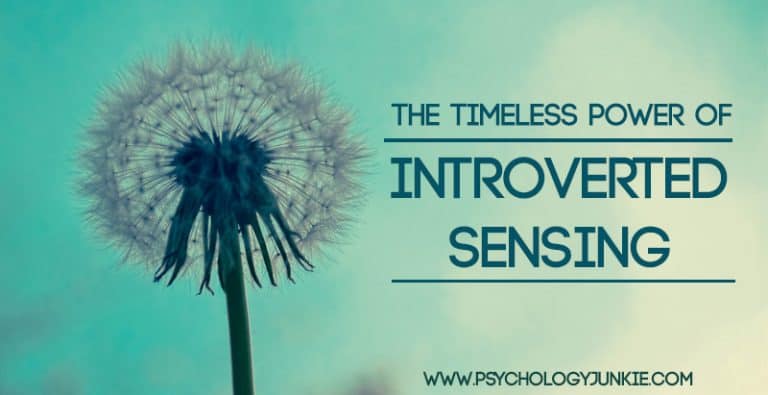
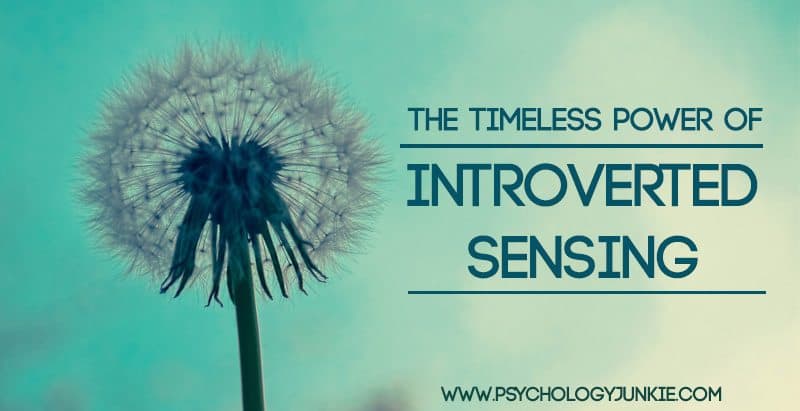
I would have been surprised had any type indicated they prefer playing before working. With that said as someone who prefers Ti-Se, I get my work done for the exact reasons given for the ISTP type. I like my free time to do my own thing, so I want to get my work out of the way.
Also the ISTP type who said, they measure how much time it takes to do a task. If given a week to do a few hours work, we may appear to procrastinate by waiting until the last minute. On the other hand we may choose to get the work out of the way, especially with personal projects around the house. I will get the work done to have the rest of my day free to do my own thing. This includes not sleeping in on my days off. I want to get tasks done to have as much free time as possible.
I’m surprised all the P types didn’t answer play before work. My ENTP ex (in his 40s) always played before work. Even if he had chores he needed to do, he wouldn’t do them right when he woke up. He’d get on his video games and play them for hours, wait until the end of the day, then do the chores, if he did them at all. When he got home late from work and he should’ve been sleeping because it was so late, he still wouldn’t do the responsible thing and just go to bed. He’d play video games for a few hours before going to bed. Many times I had to put up with him not getting to his chores for days or weeks because he kept putting them off or forgetting about them. Often he’d miss work because he didn’t feel like going in and would’ve rather slept. He didn’t like feeling rushed, so even if he woke up late with plenty of time to still get to work on time, he would just choose not to go in because he didn’t want to be in a rush getting ready. -_-+